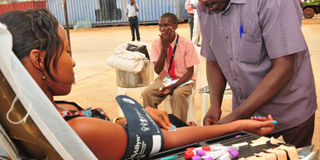Why all who can should donate

A woman donates blood at Umeme offices in Industrial Area. Blood drives like these, where people donate freely, are the only way the country can increase the amount of blood collection. Currently the blood banks collect about 200,000 units a year and yet the country needs 300,000 units annually. Photo by Faiswal Kasirye
What you need to know:
The last part of the series looks at what ought to be done to increase the amount of blood collected.
“My mother-in-law almost lost her life after a terrible accident in which she lost a lot of blood and got her leg amputated,” Ben Jumbe, my work mate narrates. With such an experience, Jumbe has never again looked at blood donation as a joke.
Before, he hardly paid attention to donation drives. But after blood transfusion saved the life of his loved one, Jumbe does not let a year pass without donating this precious liquid.
Many Ugandans have to go through such experiences to appreciate the importance of blood and unfortunately, many still have a poor attitude towards giving blood, explaining the shortage during some periods.
The general problem
Uganda has a population of more than 34 million people, but even with continuous reminders, many don’t donate blood. According to last year’s Integrated Regional Information Network ( IRIN ) report , Uganda has an annual demand of about 300,000 units of blood per year but collects roughly 250,000 units.
The limited supply of blood is not only a problem in Uganda but Africa generally. The World Health Organisation (WHO) reports that out of the 75 countries that report collecting fewer than 10 donations per 1,000 people, 38 are in Africa and all are low or middle-income countries. This means that out of 75 countries, less than one per cent of the population donates blood.
It is a troubling statistic because the demand for blood transfusion Uganda is great due to the high prevalence of anaemia, especially because of malaria and pregnancy-related complications.
Statistics from the Nakasero Blood Bank show that students are the main blood donors contributing about 80 per cent of the blood collected countrywide. This perhaps explains why blood scarcity is mainly experienced during holidays.
Many people do not donate for various reasons.
Myths, misconceptions and fear of the unknown keep them away. For others it is the lack of time. Yahaya Kiggundu, an employee with Umeme, says he lacks time especially during working hours.
“These people collecting the blood should come to our homes since we are ever busy,” he states.
However, the blood banks would likely have less success doing a door to door drive. Not only would it be expensive but people would chase them away.
Others donate but are increasingly apprehensive because of the stories they hear of people having to pay to get the blood. Hadija Mwanje, a news anchor with Dembe FM, says she donates blood but feels demoralised when the precious gift is sold to others in times of need.
The executive director of the Nakasero Blood Bank, Dr Dorothy Kyeyune, maintains that blood is free, be it a government or private hospital. However, the reality on the ground is sometimes different.
What can be done
Most of the blame for the shortage is directed towards the government. But people forget that they have a role to play in donating.
Nevertheless, the government says it is working hard to come up with feasible solutions. The Permanent Secretary Ministry of Health, Dr Asuman Lukwago, says over Shs1b is to be injected into blood drives for more blood collection.
However these funds are short of the Shs3b funds needed for mobilisation. But something can be done with what is available and Dr Lukwago says the government will be moving to the hard-to-reach areas to increase awareness on blood donation. He adds that the government is gradually decentralising blood banks.
Initially, the country had only one blood bank but after it was turned into the Uganda Blood Transfusion Service, getting more blood banks was necessary. “To realise this dream countywide, government has already established regional blood banks in Mbale, Fort portal, and Mbarara,” Dr Lukwafo says.
Because malaria patients take about 50 per cent of all the blood collected, Dr Lukwago says they have had to work at reducing the disease burden at grassroots level.
Distribution of free mosquito nets is one way the government is trying to protect the population from malaria, especially the children. Also, extending antenatal services closer to women, especially in rural areas, to reduce on maternal complications is the other way of ensuring sufficient blood supply in the country.
Individuals must be willing to give
However, with all government efforts in place, Dr Kyeyune says it’s all about peoples’ attitude towards donation. “Even with sufficient funding, it won’t bear any fruit if the public don’t respond positively towards this cause,” she states.
Now, do you realise how big a role you can play? You have a most precious resource – blood. Help share this invaluable gift with someone in need. After all, it will cost you nothing but save a life.




